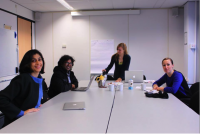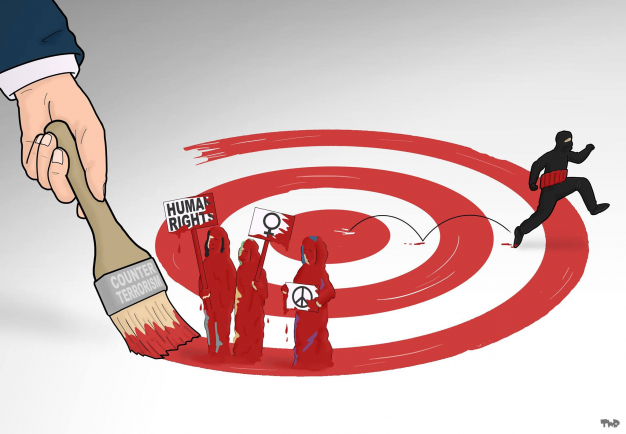 On December 6, the Women Peacemakers Program (WPP) met with two delegates from SANAM (South Asian Network to Address Masculinities), Maria Rashid Zaidi and Anand Pawar, for a strategy meeting in The Hague, the Netherlands. The Women Peacemakers Program has a long history of working with individual members of SANAM, both as trainers as trainees in several WPP Training of Trainers Cycles. Given the shared analysis of WPP and SANAM of the necessity to include a critical masculinities perspective for the advancement of the Women, Peace and Security agenda, both organizations took the opportunity of looking into further structural collaboration between the two organizations.
On December 6, the Women Peacemakers Program (WPP) met with two delegates from SANAM (South Asian Network to Address Masculinities), Maria Rashid Zaidi and Anand Pawar, for a strategy meeting in The Hague, the Netherlands. The Women Peacemakers Program has a long history of working with individual members of SANAM, both as trainers as trainees in several WPP Training of Trainers Cycles. Given the shared analysis of WPP and SANAM of the necessity to include a critical masculinities perspective for the advancement of the Women, Peace and Security agenda, both organizations took the opportunity of looking into further structural collaboration between the two organizations.
To highlight the great work of SANAM, WPP volunteer Laura Eggens interviewed Maria Rashid Zaidi about the work of SANAM, the added value of working with a masculinities perspective to advance gender equality and her personal motivation of doing this work.
Read her story below.
“Even though men are in a privileged position, gender also creates a hierarchy among them. We need to understand that by labelling women as “victims” and all men as “perpetrators” only, we are creating boxes that are far more complex in reality. For too long we have been lecturing men to be nicer, to be more sensitive, to be less violent. Yet I feel like if you want to understand why gender based violence exists, you have to understand men’s experiences where they certainly enjoy privileges under patriarchy but also face a distinct set of expectations that are often impossible to achieve. Often the opportunities for such understanding are absent. It is because of feminist work that women have found the vocabulary to talk about our experiences. Men often don’t have that vocabulary at all, to talk about themselves as victims of a system. I was lucky enough to get involved with a group of activists in South Asia who think along similar lines. We formed SANAM to look at the issues we were grappling with through a different lens.
Working with gender and women’s rights gave me a vocabulary to talk about my experiences, which I felt like I didn’t have earlier – even though I had strong feelings of injustice. Also, having two sons makes this all quite personal to me. It is very important for me that they have a better chance to be able to understand the processes and pressures that face their lives as boys and men. This is not easy, I try and talk to my children about these issues but you’re up against every system you can think of that challenges all the messages you are giving. Every possible institution reinforces patriarchal ideas and constantly pushes them in a certain direction. I hope that my sons can experiment different ways of being men and even if they are not fully successful they can at least question ideas of masculinity and see that it is not automatically a naturalized part of who they are. That is what we try to do in our workshops, creating that space to distance oneself from ideas of manhood and see that there are other ways of being as well. We try to understand how we are made subjects of a certain kind of reality, which has become so much part of you that you stop questioning it. So to begin questioning is a start.
Existing programs that worked with men can become depoliticized, as they focus only on making boys and men sensitive to women. Yet the gender regimes that affect men and women are institutionalized in larger systems. We need to address those systems that keep the ideas of patriarchy in place. This project of masculinities is not just built by individual attitudes of men or their families. Violence for instance is part and parcel of growing up to be a man, which is reflected in how men are expected to behave – not just with women but also with other men. It is a deeply fragile identity that needs constant re affirmation and often resorts to violence when it is threatened. Institutions and larger structure need men to be brave and to take risks and it is just not a cultural or societal pressure alone. For example, the state wants men to enlist in the army and be ready to protect and die for the nation. We want men to be hardened by these experiences of violence, as you want to prepare them for the hard lives they are expected to live. These ideas are not just created because we are traditional and backward people who don’t know any better. Systems shape these ideas of what it means to be a man, as well as what it means not to be a man. Those consequences may be even more violent for men.
SANAM has been a learning opportunity for me, really. This ability to link individual men’s masculinities with larger systems has been critical to my understanding. In the development world we have the tendency to simplify things, because it makes the change we want to bring more measurable. But what you’re fighting is not just yourself, what you’re challenging is in a wider sphere. When you try to understand masculinities in larger systems of power, it becomes far more complex. Change doesn’t come through a five-day workshop. All you can possibly do is start a process of questioning, where you give people enough ways to analyze and challenge these ideas. People might leave a SANAM course thinking “oh my god, what am I up against? This is just too complicated!” But that is the reality. If people are confused, they will keep thinking, reading and talking about these issues. We’re not trying to create these perfect little repositories of how masculinities should be.
In ROZAN, we talked to men who had taken affirmative action against sexual violence against women or men. Why would a man challenge their own privilege by challenging such violence? Having been with SANAM, I was more comfortable with complicated scenarios and was not looking for simplistic answers or clear causal links. As a result, we learnt many things: for instance about men’s discomfort with identifying as a victim. Men’s lives – whether these men take affirmative action or not – are littered with experiences of violence. But the masculine frame through which men understand this violence has implications for how they empathise or understand violence. They say that “it made me stronger”, or “it made me a man”. Such ideas I have been able to look at, with a wider perspective on masculinities.
In SANAM, I have been most involved with self-reflection in our curriculum. It is very important to build knowledge, but people also have to be given a space to connect with this knowledge at a very personal level. They ask themselves, what meaning does this hold for me and why? What experiences have I had that contribute to my understanding of this, which may also cloud my judgment? In ROZAN, we worked with policemen on violence against women, looking at gender and masculinity. It allowed these men a space to talk about what is means to be a man, what it means to be a policeman and what pressures it puts on their lives. In this way you allow an unpacking of the ideas of being a man. By making this discussion personal, men are able to connect to it and often see it as a great opportunity.
In SANAM, we also want our fellows to be able to relate theoretical concepts to their own lived experiences. At the same time, we felt they should also understand the larger debates surrounding these issues. We expect fellows to have a holistic understanding of how various institutions and systems frame ideas that contribute to our ideas of being a man. As a result, we hope that their work will become much more nuanced and more insightful. Nonetheless, it remains a long process. We have to keep working on it, keep improving, and keep being critical of what we’re doing. The world is not going to change completely in my lifetime, or even my children’s lifetime. And I’m okay with that. Because the alternative is what, we don’t do anything?”
Maria Rashid Zaidi from Pakistan has been working in the women’s rights movement for the last fifteen years, focusing on gender based violence against women and children. She used to work for the NGO ROZAN, but is now taking time away from the organization to take part in a PhD program at SOAS in London.
Maria was interviewed by Laura Eggens, a WPP volunteer.
SANAM, the South Asia Network to Address Masculinities, consists of about 25 people from India, Pakistan, Bangladesh, Nepal and Sri Lanka that address masculinities as a group. As a platform for cross-regional exchange, people learn from each other and invite other experts to talk about specific areas of masculinities. Some key areas of interest are conflict and violence, sexuality, globalization, media and religion.
SANAM builds knowledge and brings that across to the larger community by designing a curriculum that is used in the fellowship program. In the two cohorts SANAM organised so far, between 25 and 30 men, women and trans people from NGOs, research institutes and media gather in this intense programme to address masculinities in the region. After living and discussing together for 16-17 days in a fairly isolated place on a mountain in Nepal, fellows go home and individually develop projects based on the concepts and reflections they have just been exposed to. Someone looked at the process of grieving and masculinities in a conflict situation, for instance, while another looked at the relationships between fathers and daughters and how masculinity affects this process. The reports of the fellow’s projects and other documents are available here.
11 Dec '17 This month WPP staff interviewed Arbia Jebali and Sarah Chamekh from Free Sight Association in Tunisia about the work their organization does, how civil society space has changed over the years, which challenges they are facing now, and how civil society in Tunisia is organizing itself to overcome those challenges.
7 Nov '17 In this article, WPP staff interviewed Doron Joles of XminY Fund, an activist organization that supports social movements, action groups and changemakers fighting for a fair, democratic, sustainable and accepting world. He discusses the unique way they have chosen to hand out funds, and the challenges that go along with funding small activist organizations in the current global climate.

25 Oct '17 This Friday, the UNSCR 1325 Open Debate will take place once again, seventeen years since the adoption of landmark UN Security Council Resolution 1325 on Women, Peace and Security. In this article WPP staff reflects on the progress made for a truly transformative feminist peace agenda until now.
